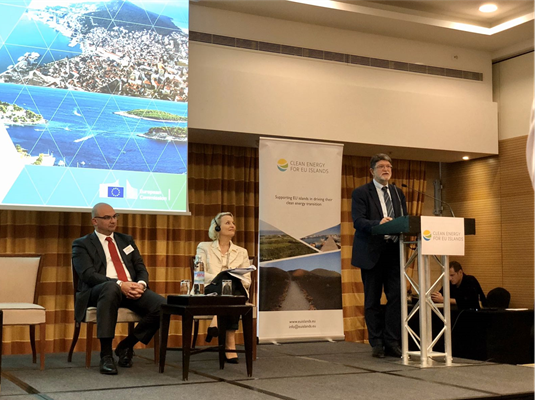"An agreement between the European Council and the European Parliament on the budget for 2020 has been reached, through the action plan, another EUR 2 million for technical assistance to islands for applications for European renewable energy projects in the next two years in ensured", the Croatian MEP Tonino Picula confirmed today, giving a speech in Split at the 4th Clean Energy Forum for the EU islands, which is being held in Croatia for the first time, in the presence of senior Croatian and EU officials.
But this is not the only good news about the European and Croatian islands today, because the representatives of the Cres-Lošinj archipelago said their goal is to completely decarbonise its energy system by 2040. This will be done in part through community-owned solar farms.
Cres-Losinj archipelago is among the six European islands that published their clean energy transition agendas today, making a firm step towards decarbonising their energy systems with a strong focus on citizen engagement. Others are the Aran Islands (Ireland), the Cres-Losinj archipelago (Croatia), Culatra (Portugal), La Palma (Spain), Salina (Italy), and Sifnos (Greece). The Forum will showcase a number of good examples and practices and foster dialogue between the various actors involved in the energy transition process of European islands, and participants will have the opportunity to see different technological solutions.
Picula welcomed the initiative by the Croatian islanders, who with ten islands involved in the previous call for funding energy transition projects, are the leaders on an European scale.
But he stressed that the sustainability of the European islands' energy transition requires both long-term and appropriate funding for complex, comprehensive projects and adequate investment in research and innovation to devise workable solutions to facilitate the energy transition, adding that he hoped that security talks the long-term financing of the energy transition of the Croatian islands to be started during the Croatian Presidency of the Union.
"In its report on the Multiannual Financial Framework for 2021 - 2027, the European Parliament proposed the introduction of a special fund of EUR 4.8 billion for a new European Union energy transition. These funds would facilitate and offset the transition to renewable energy for those most affected by the transition. The aim of the fund would be to address social, socio-economic and environmental impacts on workers and communities during the transition, which also implies many EU islands. The new Commission clearly emphasizes a new, stronger focus on the 'new green pact', so we also expect new, increased institutional and financial support for the islands", Picula said in his speech.
Picula has had islands in his focus since the start of his first term in the European Parliament. In 2016, he and his colleague A. Sant presented an Action Plan and submitted an amendment worth €2 million to the European budget, with the aim of securing funding for the island's energy transition. The lengthy negotiations within the Parliament itself, as well as discussions with the Commission and the Council, led to the inauguration of the Islands Secretariat - the first working body dedicated solely to the islands. The Secretariat was set up within the European Commission in June 2018 and presented in Brussels. It is the first working body in EU history exclusively available to islanders, but at the same time to assist the Commission in adapting existing energy policies and funds on the islands.
MEP Picula has been working to preserve and improve life on the islands since the beginning of his mandate. He is the co-founder of the Intergroup for the Seas, Rivers, Islands and Coastal Areas of the European Parliament where he is in charge of the Islands. He now leads the initiative for its reunion in this term, as 110 members from 25 EU countries have decided to join the Intergroup.


